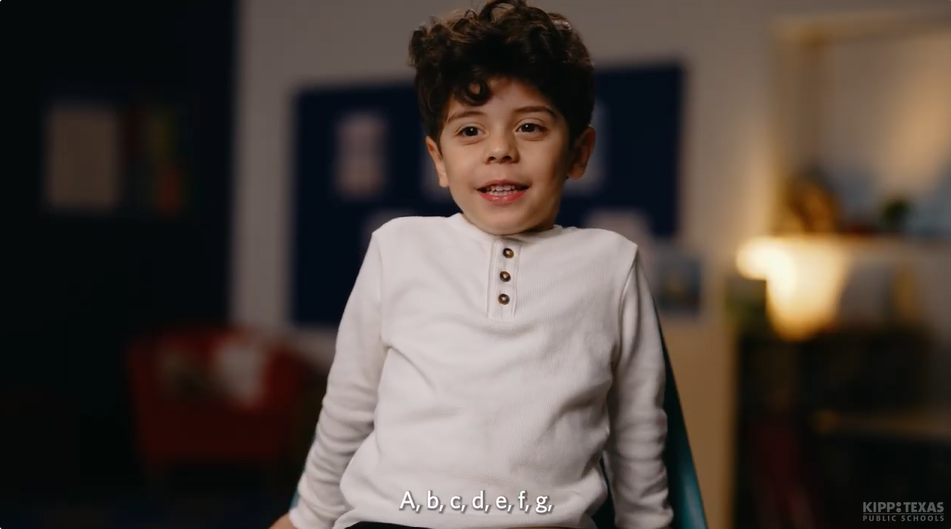Pre-Kat KIPP Texas
Our joyful Pre-K programs set a foundation of literacy and skills for a strong academic future. Starting Pre-K at KIPP Texas puts students on a path toward long-term success in K-12, college, and beyond.

“The teachers here give so much of themselves in providing a rigorous education, and yet they also prioritize the emotional, physical and mental health of their students. They are simply amazing, and my kids have grown so much.”
Join Our
Pre-K Community
KIPP Texas offers high-quality Pre-K programming in Austin, Houston, San Antonio, and Dallas-Fort Worth. Review frequently asked questions below.
Ready to Apply?

Frequently Asked Questions (FAQs)
What Pre-K programs does KIPP Texas offer?
We currently offer Pre-K programming in all four regions:
- KIPP Texas – Austin offers Full-Day Pre-K4.
- KIPP Texas – Dallas-Fort Worth offers a Full-Day Pre-K4 program.
- KIPP Texas – Houston offers half-day Pre-K3 (AM / PM) and Full-Day Pre-K4.
- KIPP Texas – San Antonio offers a Full-Day Pre-K4 program. (Pre-K4 is only available at KIPP Somos Primary)
Are KIPP Texas Pre-K programs tuition free?
There are certain eligibility requirements to qualify for free Pre-K.
Free Pre-K
To be eligible in a free Pre-K class, a child must be 3 (Pre-K3) or 4 (Pre-K4) years old by September 1 of the current school year AND:
- have limited English proficiency, or
- qualify for free and reduced-cost lunch, or
- a child of active military parent, or
- a child of a parent who was injured or killed during active military duty, or
- who have been in the care of the Department of Family and Protective Services, or
- who are homeless or
- are the child of a person who received the Star of Texas Award as a peace officer, a firefighter or an emergency medical first responder
Tuition-Based Pre-K
To be eligible in a tuition-based Pre-K class, a child must be 3 (Pre-K3) or 4(Pre-K4) years old by September 1 of the current school year AND:
- not qualify for free Pre-K
*Please note that under Senate Bill 1679, any KIPP Texas Pre-K3 student who qualifies for free Pre-K3 will automatically be eligible for free Pre-K4. This automatic qualification does not apply to New-to-KIPP (NTK) Pre-K4 students.
*For military duty, families will need to provide a military ID or letter from the VA stating a service-connected disability for those injured while on active duty.
*Schools will verify a student’s eligibility during the enrollment (NTK students) and re-enrollment process (returning students) for Pre-K. This process begins on April 1.
For half-day Pre-K programs, how is AM or PM selected?
For half-day Pre-K3 programs, students are scheduled at the campus level for either a morning or afternoon program based on availability and family schedule. Currently, KIPP Texas – Dallas-Fort Worth, KIPP Texas – San Antonio, and KIPP Texas – Austin does not offer Pre-K3.
Once I enroll my child in Pre-K at KIPP Texas, do we have to attend school?
The expectation is that once you enroll in school, you are required to attend school. Texas Compulsory Attendance: Children ages 6-18 (up to the student’s 19th birthday) are required to attend school. Compulsory attendance also applies to students below the age of 6 if the student voluntarily enrolled in Prekindergarten or Kindergarten. Learn more in the KIPP Texas Student/Parent Handbook.
What makes the Pre-K and Kindergarten experiences unique at KIPP Texas?
Our primary elementary academic model is designed to ensure our Little KIPPsters develop a love of learning from the very start. We do this by creating a safe and joyful learning environment for each student. Students spend time daily engaging in Social-Emotional Learning starting in Pre-K. Our programs also teach academics through collaboration and play such that students are in centers and guided learning throughout the school day. Additionally, our warm and friendly teachers ensure our students build knowledge by participating in enrichment courses throughout the day. These enrichment courses vary by campus and can include art, music, dance, technology, etc.
Are there before or after-school care programs available?
Please contact your school directly for more information on before and after-school programs based on grade level.
Questions about the
Pre-K program in your region?
Contact your regional Student Recruitment team for more information.

